Stacey Abrams: The Deep South woman vying to make history
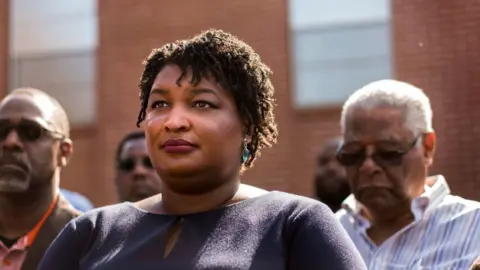 Getty Images
Getty ImagesA battle for the governor's mansion in the US state of Georgia features a woman vying to become the first black American female to run a state.
Knots of people clustered outside Hendershots coffeehouse wait for a black SUV to arrive from Atlanta 70 miles away.
The crowd untangles into a line of supporters wrapped around the exposed brick building, as evening sets upon the college town of Athens, Georgia, on an October autumn day.
A blend of parents, professors and older residents, adorned in campaign buttons and clutching signs, interrupt groups of eager students standing outside the trendy live music venue.
"Remember to vote!" they say.
It's a scene reserved for national politicians or pop stars breezing through town, but the whirring sounds of chatter and intermittent chants are for Stacey Abrams, a 44-year-old lawyer and former state legislator, who is deadlocked in a contentious race with Georgia's secretary of state, Republican Brian Kemp.
The race is emblematic of two narratives reverberating throughout the US in the wake of the election of President Donald Trump.
Mr Kemp, a self-described "politically incorrect conservative", echoes the brand of Trump Republicanism that focuses on tax cuts, protecting gun rights and "rounding up criminal illegals" in his truck - as noted in one of his early political ads.
The competing narrative is that of Ms Abrams, a progressive female candidate of colour who has appealed to minority voters, a group on which she has focused much of her campaign.
In fact, of the nearly 945,000 Georgia residents who have already cast an early vote, about 30% are black, a markedly higher rate than the 2014 mid-term figures.
Experts point out that North Carolina and South Carolina have not yet seen a similar increase among black voters, which could underscore just how energised Ms Abrams' base may be.
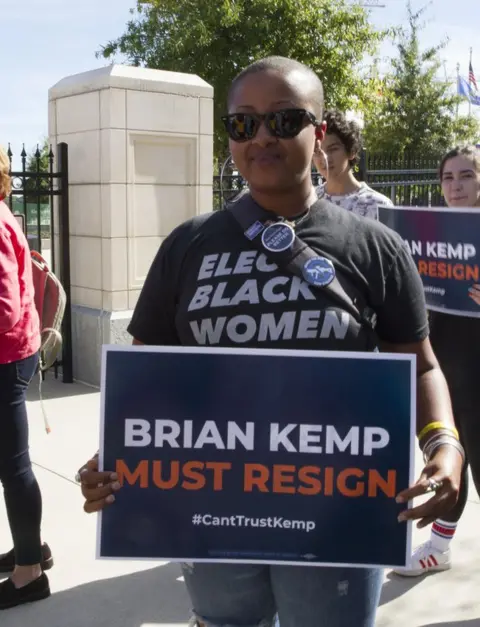
And more Georgians are registered to vote than ever before - 6.9 million out of the state's 10.4 million residents.
Jaylen Black, a 21-year-old senior at University of Georgia, has been volunteering for the Abrams campaign for a year and three months.
"Her campaign means everything to me," she says, donning a navy blue Abrams T-shirt as she walks to the candidate's next appearance at a bar down the street.
"I care about policies but truly I always felt like there was no one of either party that represented issues that were pertinent to my community, as an African American," Ms Black continues.
"And when Stacey was running, it wasn't just that she was a black woman but she just felt so real as a candidate. For the first time I felt like I was talking to somebody who was on my level like we were just people."
That authenticity appears to have resonated with Ms Abrams' most ardent supporters, many of whom affectionately refer to her as Stacey.
"I think this also starts a legacy for black women. I'm not necessarily voting for her because she's a black woman but because she's a black woman she understands in a different perspective," says 25-year-old Yanill Sanchez, an African-American graduate student at University of Georgia.
She says relieving college debt and expanding access to financial aid has struck a chord with young voters.
"She's trailblazing a movement for us", adds Andrea Glaze, a 25-year-old black graduate student standing outside Hendershots after Ms Abrams' first appearance.
A short walk from the cafe, the woman they've all come to see again see takes to the stage.
"Are you guys lost?" she asks.
"No! We're found!" a student supporter shouts as the crowd erupts into cheers beneath the festoon lights.
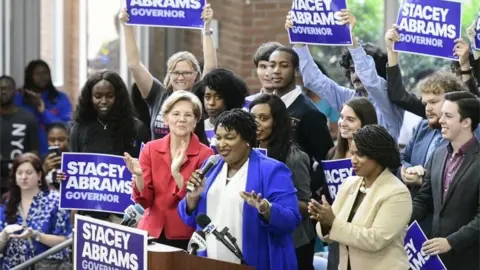 EPA
EPABorn into poverty in rural Mississippi, Ms Abrams arrived in Georgia during high school with her parents, who moved to attend Emory University's theology school to become ministers.
She graduated magna cum laude from Spelman, a historically black women's college in Atlanta, before earning a law degree from Yale and a degree in public policy from the University of Texas in Austin.
Kenja McCray, a history professor based in Atlanta who also went to Spelman, recalls Ms Abrams at university.
"She was very motivated, very serious, very focused and always running for something in SGA [Student Government Association]," she recalls.
Ms McCray began volunteering at a phone bank for Ms Abrams to show support as a fellow Spelman alumna, and to demonstrate to her two daughters, ages 18 and 20, how important it is to vote.
But the difficulty her daughters endured in trying to register shed light on how high the stakes were in this year's mid-term, Ms McCray says.
"I thought, 'how many other kids - other people - out there are going through that?' And I realised we have a lot of work to do," she says.
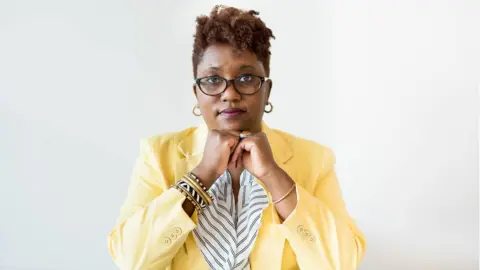 B Rich Photography
B Rich PhotographyMs Abrams' critics point out that she has attracted funding from outside donors while she's regularly featured in national headlines, appearing on the cover of Time magazine.
But her rise from poverty to power is a more familiar theme than some of her opponents may think, says LaDawn "LBJ" Jones, a lawyer in South Fulton.
"What her candidacy says to me is she can speak to the common man," she says. "It follows a narrative that Kemp supporters would like to put out, which is 'pull yourself up by your own bootstraps.'"
"Because of that background, because of that history and what she had to do to get there - I hope that is encouraging to other African Americans and people in general - that there are no limits and nothing to stop you from at least reaching your goals."

A flashpoint in voter rights
The race for the governor's mansion culminates a longstanding saga between Ms Abrams and Mr Kemp over a systemic issue at the heart of US elections - voting rights.
As secretary of state, Mr Kemp's office oversaw the cancellation of 1.5m voter registration applications between 2012-16 - 750,000 more than it did in the previous period, according to a report by New York University's Brennan Center, a public-policy think tank.
A recent report by American Public Media found that more than half a million voters were purged last year, and of those 107,000 were removed because of the so-called "use it or lose it policy", which cuts people from polls if they chose not to vote in previous elections.
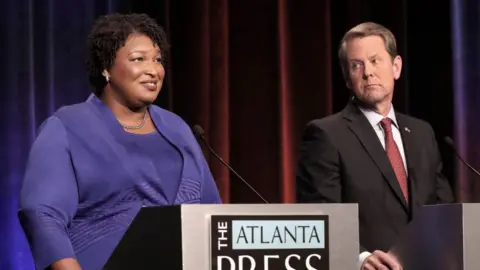 Getty Images
Getty ImagesEarlier this month, the Associated Press found that Mr Kemp's office had held up more than 53,000 voter registration applications, of which nearly 70% were filed by African Americans, over the state's so-called exact match law. African Americans make up just 32% of the state's population.
That policy, which requires applications to exactly match information on file with the Georgia Department of Driver Services or the Social Security Administrations, has delayed applications for infractions as minor as a missing hyphen in a name.
Mr Kemp has denied any wrongdoing, arguing that he has made it easier to vote and that it was the failure to properly register residents by the New Georgia Project, a voter-registration initiative he investigated in 2014 that was founded by Ms Abrams.
His campaign spokesman has said Mr Kemp is "fighting to protect the integrity of our elections and ensure that only legal citizens cast a ballot", but critics argue that it undermines eligible voters.

More on US mid-terms

Tensions are high with just a week left before election night.
Mr Kemp has attacked Ms Abrams for being "too extreme" for Georgia, pointing to her plan to expand the Medicaid health programme for the poor to stem a rural hospital shortage.
She wants "higher taxes, bigger government and a single-payer radical government takeover of healthcare", he said during a recent debate.
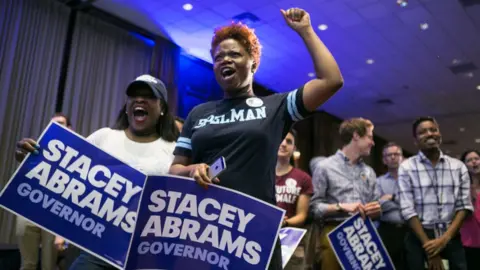 Getty Images
Getty ImagesMs Abrams was also forced to address an uncomfortable episode in which a New York Times report revealed she burned the Georgia state flag on the steps of the State Capitol in 1992 as a college freshman.
The design included the Confederate battle-flag symbol, a defiant nod to desegregation when it was adopted in 1956. She apologised for the "peaceful protest", pointing out that the flag has since changed and Mr Kemp voted to remove the symbol 10 years later.

Power of the (black female) vote
The Peach State has not seen a Democratic governor since 2003, when Sonny Perdue became the first Republican elected since Reconstruction in the late 19th Century.
But the state has seen an influx of Latinos and African Americans, who tend to lean Democratic, in recent years.
Some attribute this change to a "great reverse migration" of African Americans from northern to southern states, a reference to the six million black Americans who left the rural south during the early to mid-20th century.
Ms Abrams has focused on these voters - she has visited every one of Georgia's 159 counties, including some previously ignored by Democratic candidates.
Mrs Jones, the lawyer, admits she supported Ms Abrams' opponent in the Democratic primary, Stacy Evans, a white woman.
"What we found out in the end is Stacey Abrams worked her tail off," Mrs Jones says. "She touched on the doors of people who had not had their doors knocked on by a candidate in years."
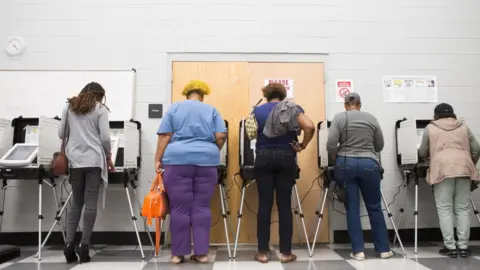 Getty Images
Getty ImagesWhile turning out the vote has been a major component of the Abrams campaign, black women in Georgia have been a consistent voting bloc in recent years.
And this year the interest has increased. Turnout among black female voters in this year's Democratic state primary jumped 32% on 2014, according to data from the secretary of state's office.
Mrs McCray feels like black female voters sometimes "fall through the cracks" when it comes to political representation.
"One of the pitfalls of being a faithful voter is that you can be taken for granted and that is a narrative that is a concern about the Democratic Party," she says.
"We face a lot more obstacles in terms of getting those leadership positions so it's important to see somebody win who represents us."

Changing of the guard
Women of colour, who currently hold just eight (2.6%) statewide elected executive offices, represent 10% of all nominees and 30% of female nominees for statewide elected executive office this year, according to Kelly Dittmar of the Center for American Women in Politics.
Female state legislative candidates have won nominations in record numbers this year, she adds. It's a trend analysts are seeing on a national stage, too.
Michigan's Rashida Tlaib and Minnesota's Ilhan Omar, both Democrats, are poised to become the first Muslim-American women in Congress. Two more Democratic black women, Jahana Hayes and Ayanna Pressley, are also set to be the first women of colour in their states' congressional delegations.
That enthusiasm for change is felt in a corner of Georgia considered to be the most diverse county in the state, if not the entire US southeast.
Marlene Taylor-Crawford moved to Georgia nearly 20 years ago, trading in the dense, pockmarked streets of New York City for the sweeping highways that loop the outskirts of Atlanta, leading to northeast to Gwinnett County.
"It was like stepping into a time warp," the single mother of three, who is African American, recalls of the mostly white community after arriving in 1999. "I had to find my way to be around people who shared my interests."
The former farming community, home to about 920,000 residents and 16 municipalities, has transformed into a majority-non-white county.
That new makeup - about 28% African American, 21% Latinos and 12% Asians - has not always been reflected in government, says Ms Taylor-Crawford, president of the community's United Ebony Society.
"If you went to a Gwinnett County commission meeting and knew nothing about Gwinnett County you would think this community is 99% white," she says.
But change is afoot both in Gwinnett County and elsewhere in Georgia.
In fact, the county elected its first African-American judge - a woman - in September and two cities recently voted for Gwinnett's first-ever black mayors.
Ms Taylor-Crawford is confident that voters are more engaged because of candidates like Ms Abrams. She's seeing new faces at local government meetings, she says, and receiving more calls about United Ebony Society events.
"We are a strong voting bloc, we vote consistently and we encourage others to vote so our voices are very strong," she contends of black female voters in Gwinnett.
Much like Gwinnett, the US is expected to become majority-non-white by 2044, according to the US Census Bureau.
And what happens in Gwinnett County could be a harbinger for whether Georgia will see the country's first black governor.
"She represents strength, perseverance and faith. She is showing Georgia that we are still rising, we can still accomplish and we will accomplish," she says of Ms Abrams.

Will Georgia make history?
Will the enthusiasm for Ms Abrams change Georgia from red (Republican) to blue (Democratic)?
President Trump, who has endorsed Mr Kemp for governor, won Georgia easily against Hillary Clinton.
But Ms Jones thinks that Mr Trump hasn't "moved the needle" with the African-American community, despite the president's penchant for touting a record-low black unemployment rate.
She says Mr Trump may have "lowered the bar" on civility, but that the black community is more energised to turn out because of the names on the ballot.
"People are excited because they're mad at Trump, but they're excited because for the first time a candidate has put in the energy to come and ask them to vote and explain why their vote matters."
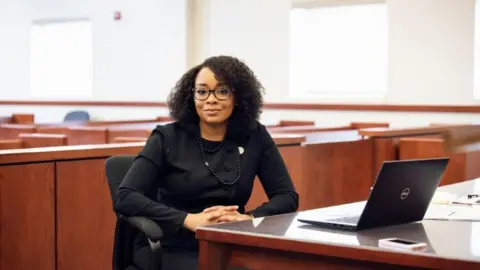 Reginald Duncan/Cranium Creation
Reginald Duncan/Cranium CreationMs Abrams has been a tax attorney, a romance novelist and Atlanta's deputy city attorney before she became the first woman to lead a caucus in Georgia's state legislature as House minority leader.
Whether she again will etch her name in Georgia's history books is up to the voters, but her candidacy marks a change in political winds for African-American women.
"I work with people running for elected office and prior to Stacey Abrams I had a whole session on how to dress, what to wear and what you should and shouldn't do," Mrs Jones recalls.
"I have changed that. It no longer means straightening your hair to please the people whose door you're knocking on, or wearing a face full of makeup because you're a woman.
"Stacey being authentically herself has opened the door to many people, but particularly African-American women who identify with her who can say, 'I can run for office and I'm not prohibited because I have dreadlocks.'"
